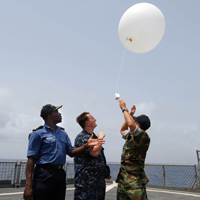In his greeting sent to the 16th World Meteorological Congress, which wrapped up in Geneva on June 3, U.N. Secretary General Ban Ki-moon welcomed proposals on the congress' agenda that he said (.pdf) would "assist the poorest and most vulnerable countries [to] adapt to inevitable impacts [of climate change]." Ban urged members to "continue [their] work to improve predictions and early warning on impending weather and climate hazards. This issue will only grow in importance."
Indeed, increases in climate variability have negatively affected the economic development and welfare of the least developed nations over the past several decades. For much of Africa, two important goals have emerged: improving the quality and accuracy of climate data and finding a practical way to make that data accessible.
Though Africa, with fewer weather stations than the developed world, collects a comparatively small amount of climate data, the value of that information may be immeasurable in terms of living conditions there. Climate data can foster the sustainable development of countries dependent on rain-fed agriculture, for example, and the variables that affect rural agriculture are good indicators of poverty vulnerability. Scientists believe that readily accessible African data could make forecasts more accurate and easier to disseminate rapidly, allowing farmers, aid workers and public health experts to better prepare and plan for catastrophic and common weather events alike.

